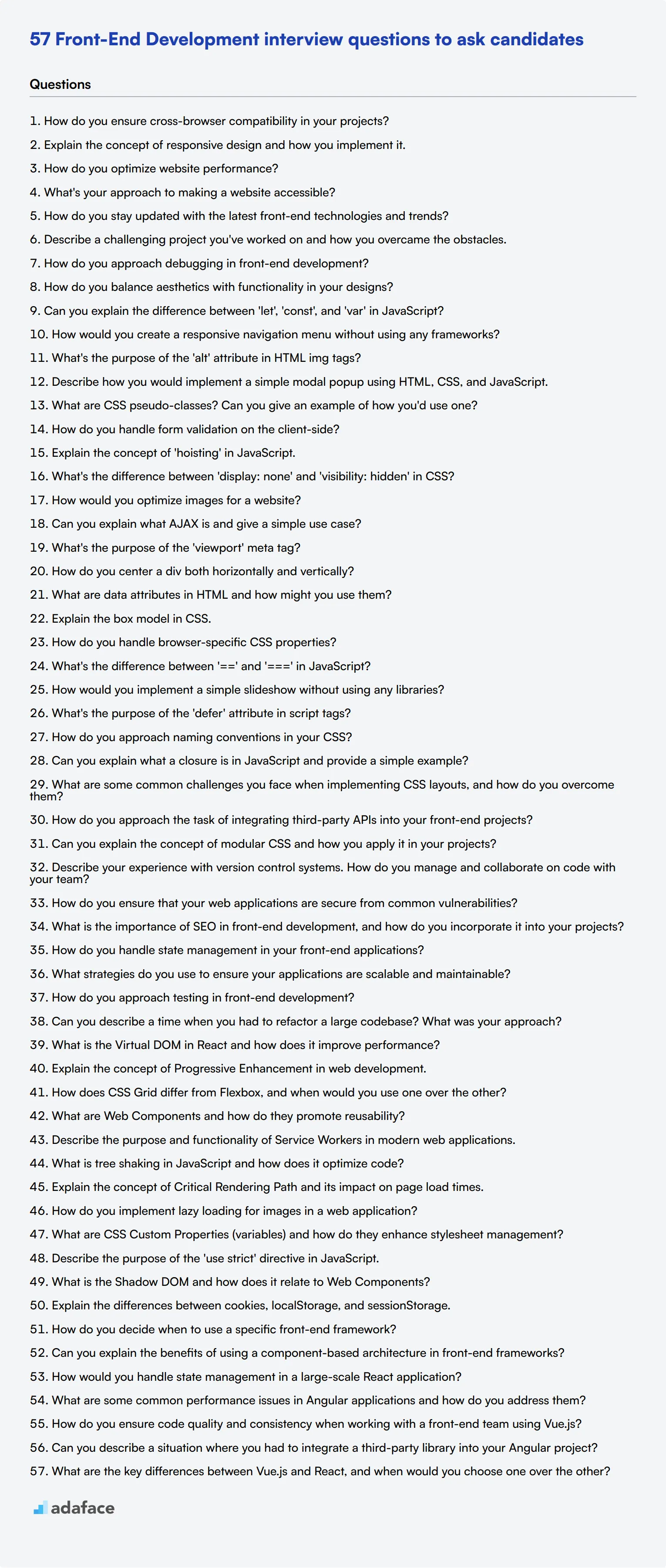Front-end development is a critical aspect of creating user-friendly and visually appealing websites and applications. As a recruiter or hiring manager, having a comprehensive list of interview questions is invaluable for identifying top talent in this field.
This blog post offers a curated selection of front-end development interview questions tailored for different experience levels. We cover general questions, junior and mid-tier developer inquiries, technical knowledge assessments, and framework-related queries.
By utilizing these questions, you can effectively evaluate candidates' skills and make informed hiring decisions. Additionally, consider using pre-interview assessments to streamline your recruitment process and identify the most promising candidates for in-depth interviews.
Table of contents
8 general Front-End Development interview questions and answers to assess candidates
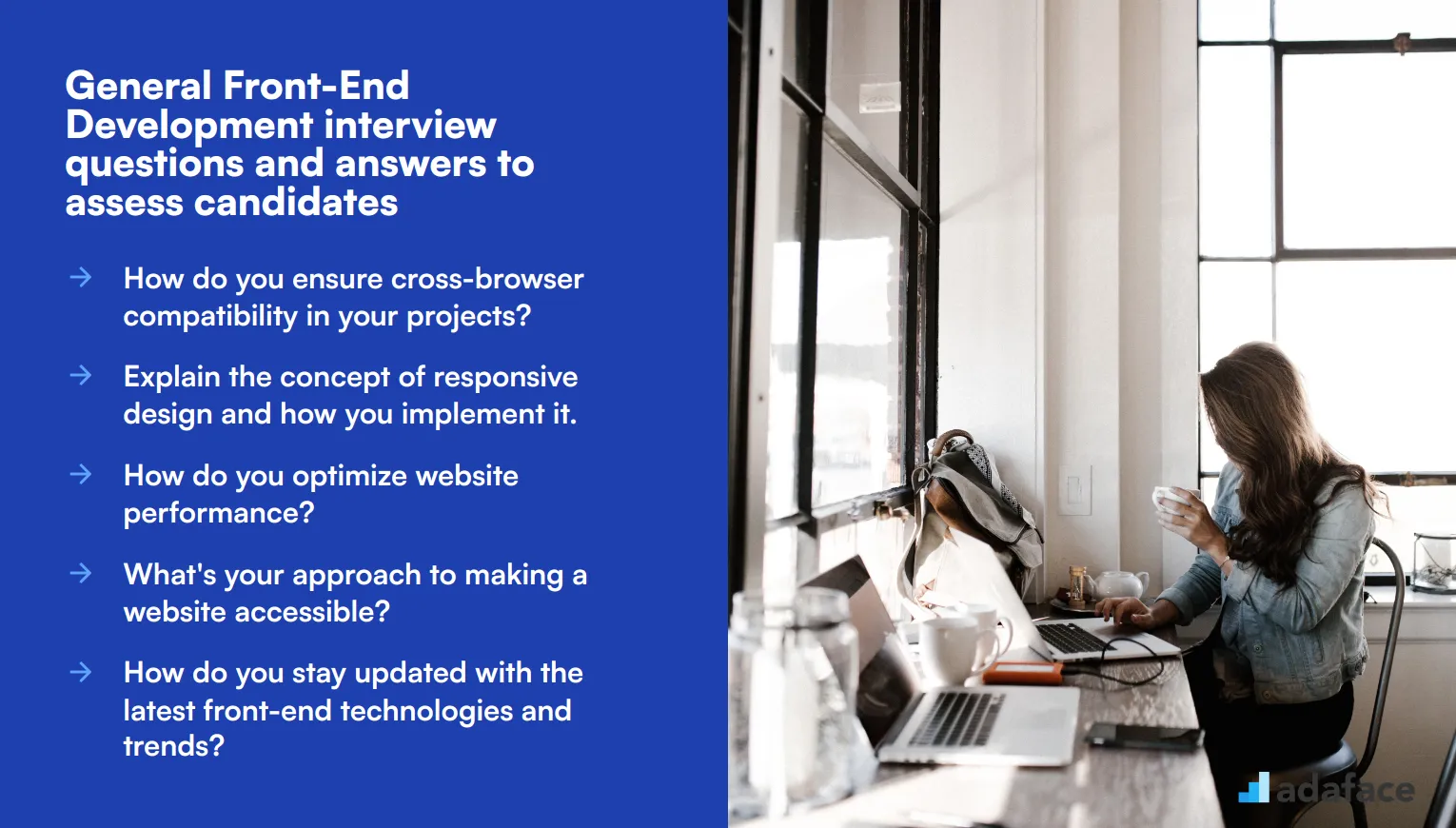
Ready to dive into the world of Front-End Development interviews? These 8 general questions will help you assess candidates' knowledge and problem-solving skills. Use them to spark engaging discussions and get a feel for how candidates approach real-world scenarios. Remember, the best interviews are conversations, not interrogations!
1. How do you ensure cross-browser compatibility in your projects?
A strong candidate should mention several strategies for ensuring cross-browser compatibility:
- Using CSS resets or normalizers to create a consistent baseline across browsers
- Testing on multiple browsers and devices throughout development
- Utilizing feature detection libraries like Modernizr
- Implementing graceful degradation or progressive enhancement techniques
- Staying updated on browser-specific quirks and implementing necessary workarounds
Look for candidates who emphasize the importance of testing and demonstrate awareness of browser differences. Follow up by asking about specific challenges they've faced with cross-browser compatibility and how they resolved them.
2. Explain the concept of responsive design and how you implement it.
Responsive design is an approach to web design that makes web pages render well on various devices and window or screen sizes. A good answer should include:
- Using flexible grids and layouts
- Implementing CSS media queries to apply different styles based on device characteristics
- Utilizing flexible images and media that scale with the layout
- Considering content prioritization for smaller screens
- Employing CSS frameworks like Bootstrap or Foundation that have built-in responsive features
Ideal candidates should demonstrate an understanding of mobile-first design principles and be able to discuss specific responsive design techniques they've used in past projects.
3. How do you optimize website performance?
Candidates should be able to discuss various techniques for improving website speed and performance:
- Minimizing HTTP requests
- Optimizing and compressing images
- Leveraging browser caching
- Minifying CSS, JavaScript, and HTML
- Using Content Delivery Networks (CDNs)
- Implementing lazy loading for images and other media
- Reducing server response time
- Prioritizing above-the-fold content
Look for answers that show a comprehensive understanding of both front-end and back-end optimizations. Ask candidates to share experiences where they significantly improved a website's performance and the metrics they used to measure success.
4. What's your approach to making a website accessible?
A strong answer should cover various aspects of web accessibility:
- Following WCAG (Web Content Accessibility Guidelines) standards
- Using semantic HTML elements
- Providing alternative text for images
- Ensuring keyboard navigation functionality
- Creating sufficient color contrast
- Implementing ARIA (Accessible Rich Internet Applications) attributes where necessary
- Testing with screen readers and other assistive technologies
Look for candidates who show genuine concern for inclusivity and understand that accessibility benefits all users, not just those with disabilities. Ask about specific challenges they've faced in implementing accessible features and how they overcame them.
5. How do you stay updated with the latest front-end technologies and trends?
Candidates should demonstrate a proactive approach to continuous learning. Good answers might include:
- Following industry leaders and developers on social media
- Regularly reading tech blogs and newsletters
- Participating in online forums and communities (e.g., Stack Overflow, GitHub)
- Attending web development conferences and meetups
- Taking online courses or obtaining certifications
- Experimenting with new technologies in side projects
- Contributing to open-source projects
Look for candidates who show genuine enthusiasm for learning and can discuss recent trends or technologies they've explored. This question helps assess a candidate's passion for the field and their ability to adapt to the ever-changing landscape of front-end development.
6. Describe a challenging project you've worked on and how you overcame the obstacles.
This question allows candidates to showcase their problem-solving skills and experience. A good answer should:
- Clearly describe the project and its challenges
- Explain the steps taken to address the problems
- Discuss any collaboration with team members or stakeholders
- Highlight the lessons learned from the experience
- Mention the successful outcome and any positive feedback received
Pay attention to how candidates structure their response and whether they can articulate complex problems clearly. Look for evidence of critical thinking, teamwork, and the ability to learn from difficult situations. This question can provide insights into a candidate's technical skills as well as their soft skills.
7. How do you approach debugging in front-end development?
Effective debugging is crucial for front-end developers. A comprehensive answer might include:
- Using browser developer tools (e.g., Chrome DevTools) for inspecting elements, network activity, and JavaScript console
- Implementing logging statements to track code execution
- Utilizing breakpoints and step-through debugging
- Checking for browser compatibility issues
- Using linting tools to catch potential errors early
- Employing version control to isolate when issues were introduced
- Collaborating with team members for fresh perspectives
Look for candidates who demonstrate a systematic approach to problem-solving and familiarity with various debugging tools. Ask about a specific bug they encountered recently and how they resolved it to gauge their real-world debugging skills.
8. How do you balance aesthetics with functionality in your designs?
This question assesses a candidate's understanding of user experience (UX) principles. A good answer should touch on:
- Prioritizing user needs and business goals
- Conducting user research and usability testing
- Collaborating closely with UX designers and stakeholders
- Ensuring designs are both visually appealing and intuitive to use
- Considering performance implications of design choices
- Iterating based on user feedback and analytics
Look for candidates who understand that great front-end development goes beyond just writing code. They should demonstrate an appreciation for the importance of user-centered design and the ability to communicate effectively with designers and other team members.
20 Front-End Development interview questions to ask junior developers
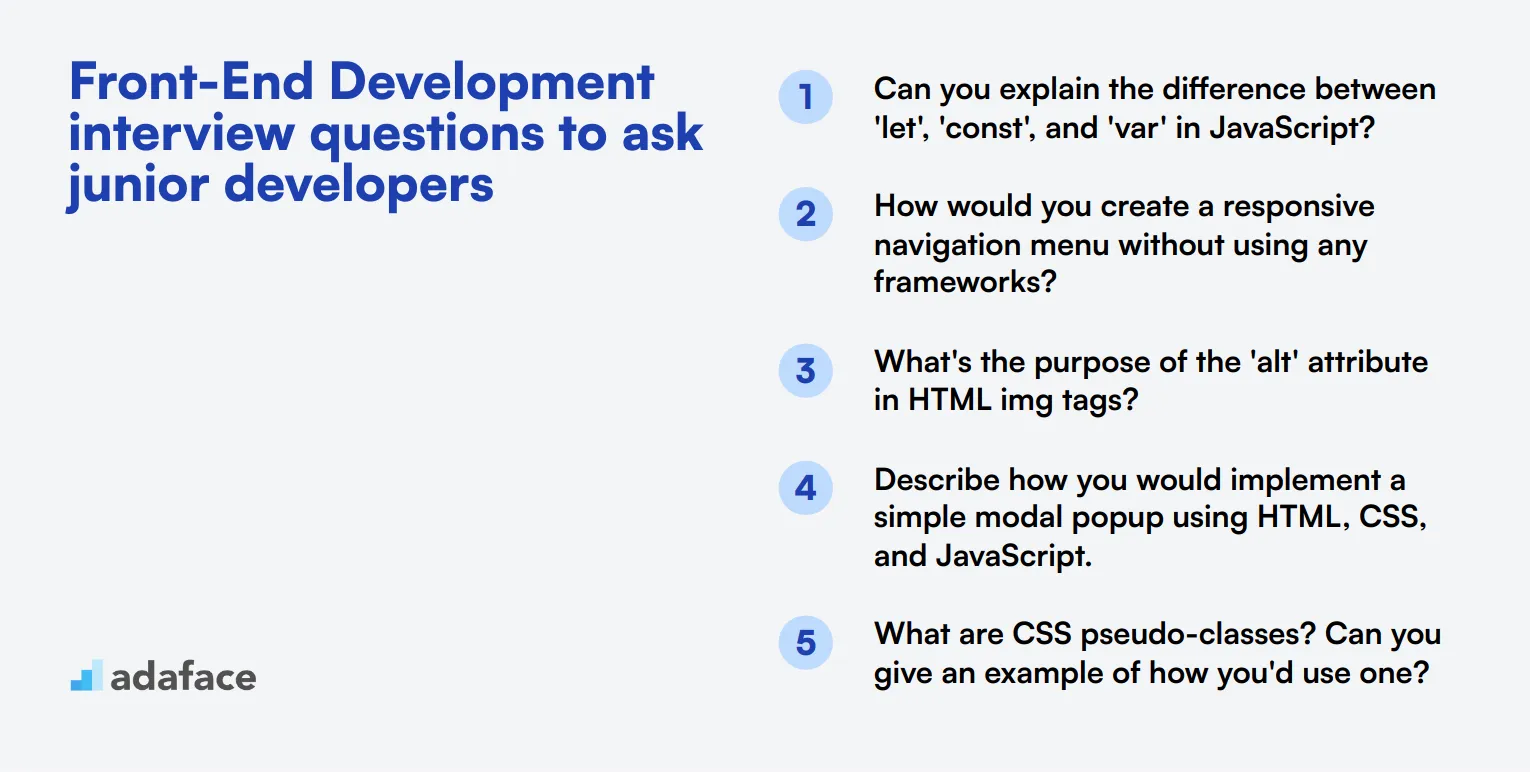
When interviewing junior developers for front-end positions, it's crucial to assess their foundational knowledge and problem-solving skills. Use these questions to gauge candidates' understanding of core concepts and their ability to apply them in real-world scenarios.
- Can you explain the difference between 'let', 'const', and 'var' in JavaScript?
- How would you create a responsive navigation menu without using any frameworks?
- What's the purpose of the 'alt' attribute in HTML img tags?
- Describe how you would implement a simple modal popup using HTML, CSS, and JavaScript.
- What are CSS pseudo-classes? Can you give an example of how you'd use one?
- How do you handle form validation on the client-side?
- Explain the concept of 'hoisting' in JavaScript.
- What's the difference between 'display: none' and 'visibility: hidden' in CSS?
- How would you optimize images for a website?
- Can you explain what AJAX is and give a simple use case?
- What's the purpose of the 'viewport' meta tag?
- How do you center a div both horizontally and vertically?
- What are data attributes in HTML and how might you use them?
- Explain the box model in CSS.
- How do you handle browser-specific CSS properties?
- What's the difference between '==' and '===' in JavaScript?
- How would you implement a simple slideshow without using any libraries?
- What's the purpose of the 'defer' attribute in script tags?
- How do you approach naming conventions in your CSS?
- Can you explain what a closure is in JavaScript and provide a simple example?
10 intermediate Front-End Development interview questions and answers to ask mid-tier developers
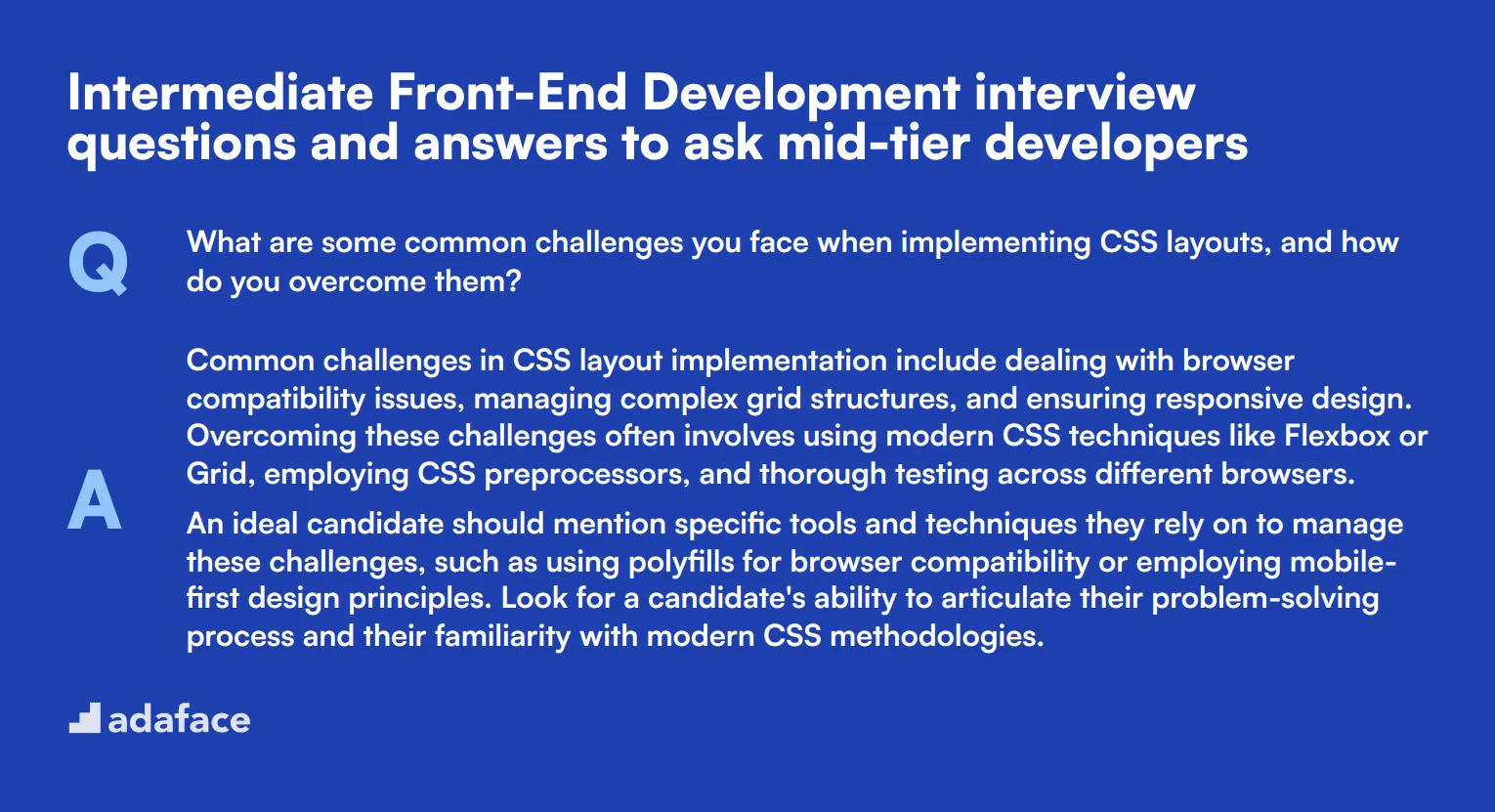
To assess whether your mid-tier front-end developer candidates have the right balance of experience and knowledge, use these 10 intermediate-level questions. These questions will help you gauge their problem-solving abilities, design principles, and understanding of essential front-end concepts, ensuring you find the best fit for your team.
1. What are some common challenges you face when implementing CSS layouts, and how do you overcome them?
Common challenges in CSS layout implementation include dealing with browser compatibility issues, managing complex grid structures, and ensuring responsive design. Overcoming these challenges often involves using modern CSS techniques like Flexbox or Grid, employing CSS preprocessors, and thorough testing across different browsers.
An ideal candidate should mention specific tools and techniques they rely on to manage these challenges, such as using polyfills for browser compatibility or employing mobile-first design principles. Look for a candidate's ability to articulate their problem-solving process and their familiarity with modern CSS methodologies.
2. How do you approach the task of integrating third-party APIs into your front-end projects?
Integrating third-party APIs involves several steps: understanding the API documentation, setting up authentication if required, and implementing the API calls using technologies like Fetch or Axios. Error handling and data transformation are also critical to ensure smooth integration.
A strong candidate should demonstrate a clear understanding of how to read and implement API documentation, manage authentication tokens securely, and handle potential errors gracefully. They should also be able to discuss any previous experiences with specific APIs and the challenges they faced during those integrations.
3. Can you explain the concept of modular CSS and how you apply it in your projects?
Modular CSS refers to the practice of breaking down CSS into smaller, reusable modules that can be independently maintained and updated. This approach helps in keeping the codebase organized and reduces the risk of style conflicts. Techniques like CSS Modules or methodologies like BEM (Block, Element, Modifier) are often used to achieve this.
When evaluating the answer, look for a candidate's experience with specific methodologies or tools. They should be able to explain the benefits of modular CSS, such as improved maintainability and scalability, and provide examples of how they've implemented it in past projects.
4. Describe your experience with version control systems. How do you manage and collaborate on code with your team?
Version control systems like Git are essential for managing code changes and collaborating with team members. Using branches for different features, committing changes with meaningful messages, and conducting code reviews are standard practices. Platforms like GitHub or GitLab facilitate these processes by providing tools for pull requests and issue tracking.
A candidate should demonstrate familiarity with these tools and practices, emphasizing their experience with collaborative workflows. They should also discuss how they handle merge conflicts and their approach to maintaining a clean and organized repository.
5. How do you ensure that your web applications are secure from common vulnerabilities?
Ensuring web application security involves several practices: validating and sanitizing user inputs, using HTTPS, implementing content security policies, and keeping dependencies updated. Awareness of common vulnerabilities like XSS (Cross-Site Scripting) and CSRF (Cross-Site Request Forgery) is crucial.
Look for candidates who can discuss specific security measures they've implemented in past projects. They should also demonstrate an understanding of the OWASP Top Ten security risks and explain how they stay updated on security best practices.
6. What is the importance of SEO in front-end development, and how do you incorporate it into your projects?
SEO (Search Engine Optimization) is crucial for improving a website's visibility in search engine results, which can drive more traffic and increase user engagement. Front-end developers can contribute to SEO by ensuring clean, semantic HTML, optimizing images, and using proper meta tags.
An ideal candidate should be able to explain specific techniques they've used to enhance SEO, such as implementing structured data or optimizing page load times. They should also discuss how they collaborate with other team members, like content creators and SEO specialists, to achieve these goals.
7. How do you handle state management in your front-end applications?
State management is essential for maintaining consistency and predictability in front-end applications. Techniques for state management include using libraries like Redux or Context API in React, or Vuex in Vue.js. These tools help manage the application's state in a centralized store, making it easier to track and update.
Candidates should demonstrate their understanding of state management principles and discuss their experience with specific tools. They should also be able to explain how they handle complex state scenarios and ensure that the state remains consistent across the application.
8. What strategies do you use to ensure your applications are scalable and maintainable?
Ensuring scalability and maintainability involves writing clean, modular code, following design patterns, and using component-based architectures. Implementing efficient state management, optimizing performance, and conducting regular code reviews also contribute to these goals.
A candidate should be able to discuss their approach to writing scalable and maintainable code, providing examples from past projects. They should also highlight the importance of documentation and testing in maintaining high-quality code over time.
9. How do you approach testing in front-end development?
Testing is crucial for ensuring the reliability and functionality of front-end applications. Different types of tests include unit tests, integration tests, and end-to-end tests. Tools like Jest, Mocha, and Cypress are commonly used for these testing purposes.
Candidates should explain their experience with these tools and discuss their approach to writing and maintaining tests. They should also highlight the importance of automated testing in catching bugs early and ensuring a smooth development process.
10. Can you describe a time when you had to refactor a large codebase? What was your approach?
Refactoring a large codebase involves identifying areas for improvement, breaking down the refactoring process into manageable tasks, and testing thoroughly to ensure no new issues are introduced. The goal is to improve code readability, maintainability, and performance without changing the application's functionality.
A strong candidate should provide a specific example of a refactoring project, discussing the challenges they faced and their strategy for overcoming them. They should also emphasize the importance of communication and collaboration with team members during the refactoring process.
12 Front-End Development interview questions about technical knowledge and definitions
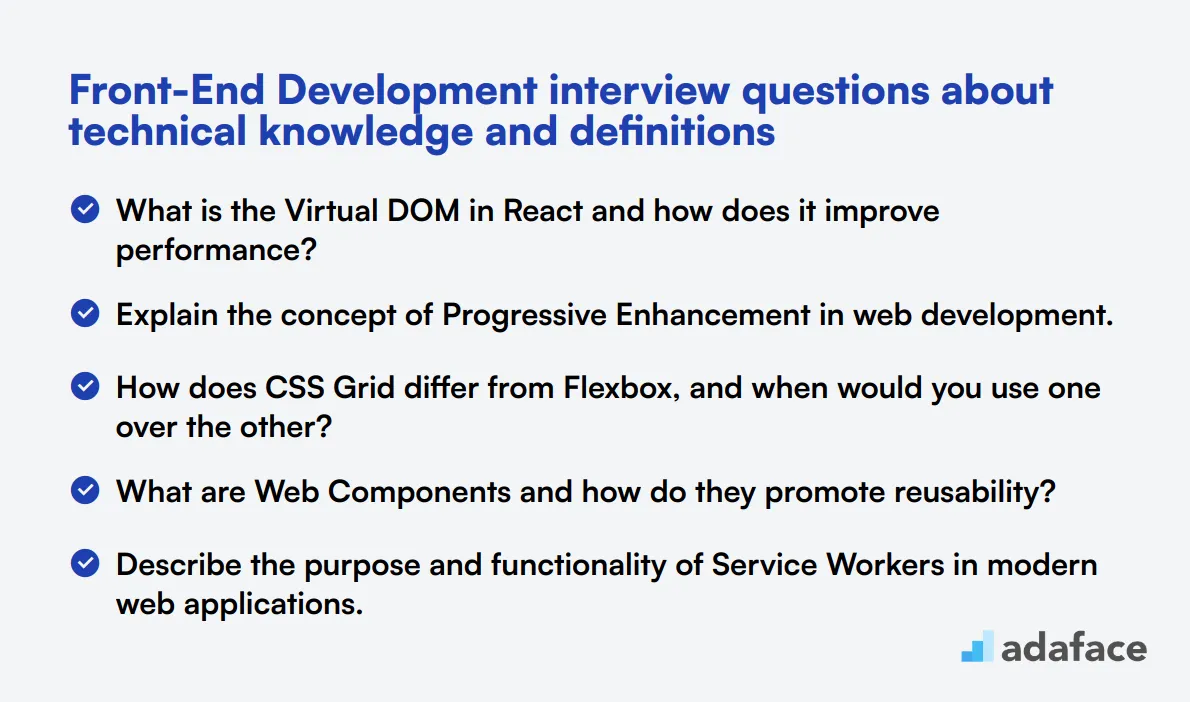
To assess a candidate's technical knowledge and understanding of core front-end concepts, use these carefully curated interview questions. They cover essential topics and will help you gauge the depth of a candidate's expertise in front-end development.
- What is the Virtual DOM in React and how does it improve performance?
- Explain the concept of Progressive Enhancement in web development.
- How does CSS Grid differ from Flexbox, and when would you use one over the other?
- What are Web Components and how do they promote reusability?
- Describe the purpose and functionality of Service Workers in modern web applications.
- What is tree shaking in JavaScript and how does it optimize code?
- Explain the concept of Critical Rendering Path and its impact on page load times.
- How do you implement lazy loading for images in a web application?
- What are CSS Custom Properties (variables) and how do they enhance stylesheet management?
- Describe the purpose of the 'use strict' directive in JavaScript.
- What is the Shadow DOM and how does it relate to Web Components?
- Explain the differences between cookies, localStorage, and sessionStorage.
7 Front-End Development interview questions and answers related to frameworks
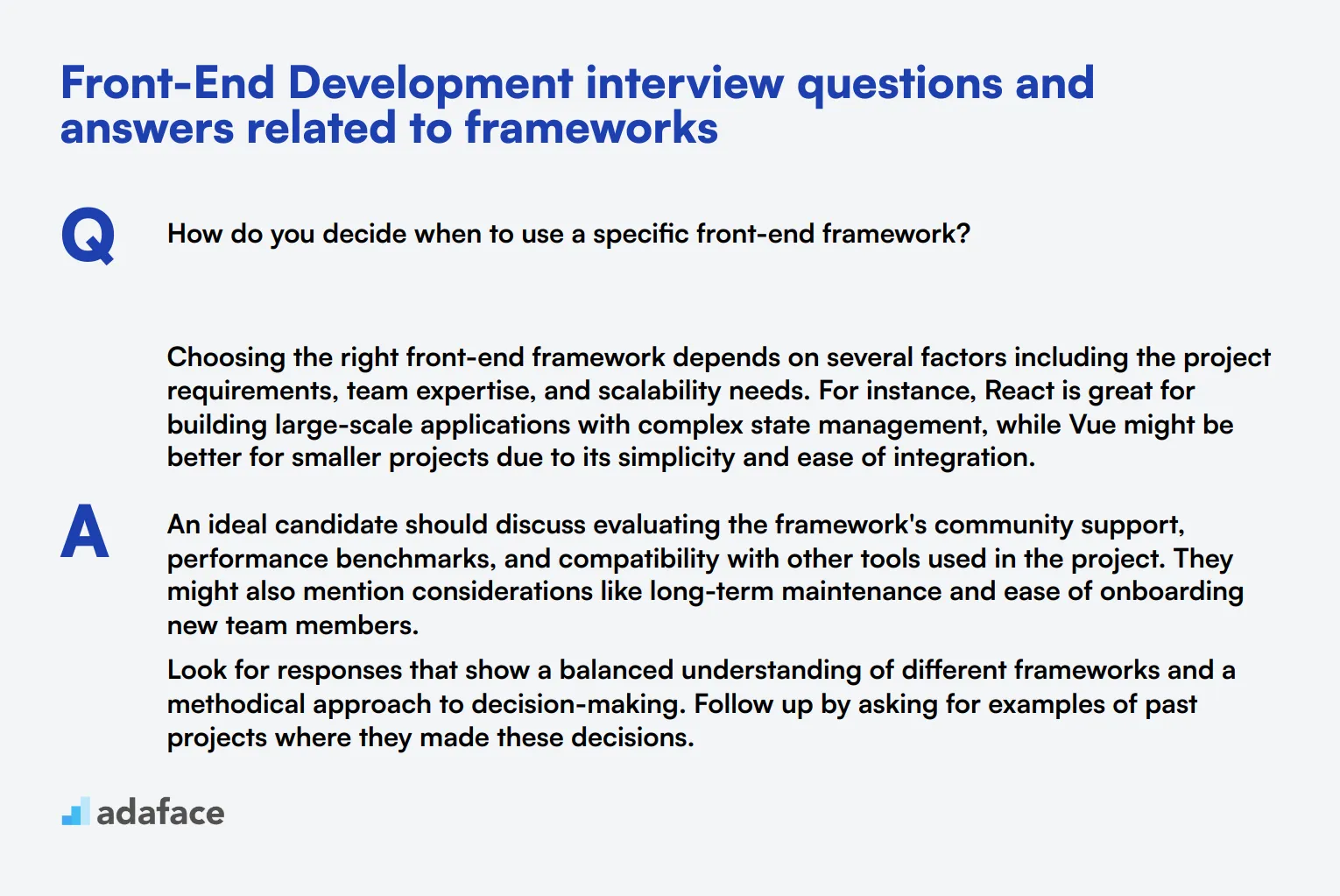
To know if your candidates are well-versed with popular front-end frameworks, these curated interview questions will help you gauge their grasp on tools like React, Angular, and Vue. Use this list to ensure that your next hire can seamlessly integrate and utilize these frameworks in your projects.
1. How do you decide when to use a specific front-end framework?
Choosing the right front-end framework depends on several factors including the project requirements, team expertise, and scalability needs. For instance, React is great for building large-scale applications with complex state management, while Vue might be better for smaller projects due to its simplicity and ease of integration.
An ideal candidate should discuss evaluating the framework's community support, performance benchmarks, and compatibility with other tools used in the project. They might also mention considerations like long-term maintenance and ease of onboarding new team members.
Look for responses that show a balanced understanding of different frameworks and a methodical approach to decision-making. Follow up by asking for examples of past projects where they made these decisions.
2. Can you explain the benefits of using a component-based architecture in front-end frameworks?
A component-based architecture enhances reusability and maintainability by breaking the UI into smaller, self-contained pieces. Each component encapsulates its own logic, styles, and behavior, which makes it easier to manage and debug.
This approach also promotes consistency across the application, as components can be reused in multiple places with minimal changes. It allows for better collaboration among team members, as each person can work on different components simultaneously.
Ideal candidates should highlight the efficiency gained from reusability and the ease of managing large codebases. They should also mention how a component-based structure can improve the scalability and testability of the application. Consider asking for specific examples from their previous work.
3. How would you handle state management in a large-scale React application?
In a large-scale React application, managing state effectively is crucial. Tools like Redux or Context API are commonly used for this purpose. Redux provides a centralized store for all application states, making it easier to manage and debug, while Context API is useful for smaller state management needs without adding much overhead.
Candidates should discuss their approach to structuring the state, such as breaking it down into smaller, manageable slices and using middleware for handling asynchronous actions. They might also mention using libraries like Redux Toolkit to simplify boilerplate code.
Look for answers that demonstrate a clear understanding of the complexities involved in state management and the ability to choose the right tool for the job. A good follow-up question could be about their experience with React JS Developer job description and state management in past projects.
4. What are some common performance issues in Angular applications and how do you address them?
Common performance issues in Angular applications include excessive change detection cycles, large bundle sizes, and inefficient use of observables. To address these, you can use strategies like OnPush change detection, lazy loading modules, and the Angular CLI's built-in optimization features.
Candidates should explain techniques like debouncing or throttling for optimizing observable streams, and using Angular's built-in tools for analyzing and reducing bundle sizes. They might also mention using Ahead-of-Time (AOT) compilation to improve load times.
Ideal responses will show a thorough understanding of Angular’s performance optimization techniques and practical experience in implementing them. Consider asking for specific examples or case studies from their previous work to gauge depth of knowledge.
5. How do you ensure code quality and consistency when working with a front-end team using Vue.js?
Ensuring code quality and consistency in a team using Vue.js involves implementing best practices such as using a style guide (like Vue's own style guide), enforcing coding standards with linters, and using tools like Prettier for formatting.
Candidates should also mention the importance of writing unit tests and integrating Continuous Integration/Continuous Deployment (CI/CD) pipelines to automate testing and deployment. Using Vue CLI plugins can help enforce these standards across the team.
Look for answers that demonstrate a proactive approach to maintaining code quality and consistency. Ask about their experience with specific tools and practices, and how they have implemented these in Vue.js Developer job description projects.
6. Can you describe a situation where you had to integrate a third-party library into your Angular project?
Integrating a third-party library in an Angular project involves several steps: evaluating the library's compatibility with Angular, installing it via npm, configuring Angular modules to include the library, and then using the library in your components or services.
Candidates should discuss the importance of checking for up-to-date documentation and community support. They might also mention the need to write wrapper components or services to abstract the library's usage within the Angular framework.
Ideal responses will include specific examples of libraries they have integrated and any challenges they faced during the process. Follow up by asking how they ensured the library did not negatively impact the application's performance or maintainability.
7. What are the key differences between Vue.js and React, and when would you choose one over the other?
Vue.js and React have different design philosophies. Vue.js is a progressive framework that is easy to integrate into existing projects and has a more opinionated structure. React, on the other hand, is a library focused on building UI components and offers more flexibility but requires additional setup for state management and routing.
Candidates should mention that Vue is generally easier to learn for beginners due to its simpler syntax and detailed documentation, while React's ecosystem is more mature and offers extensive third-party libraries and tools. Choosing between them often depends on the project's complexity, team expertise, and specific requirements.
Look for answers that show a balanced understanding of both frameworks and the ability to make informed decisions based on project needs. Ask for examples of projects where they had to choose one framework over the other and their reasoning behind it.
Which Front-End Development skills should you evaluate during the interview phase?
While a single interview may not reveal everything about a candidate's capabilities, focusing on key front-end development skills is imperative. These skills are indispensable for assessing whether a candidate can handle the real-world challenges they will face in their role.
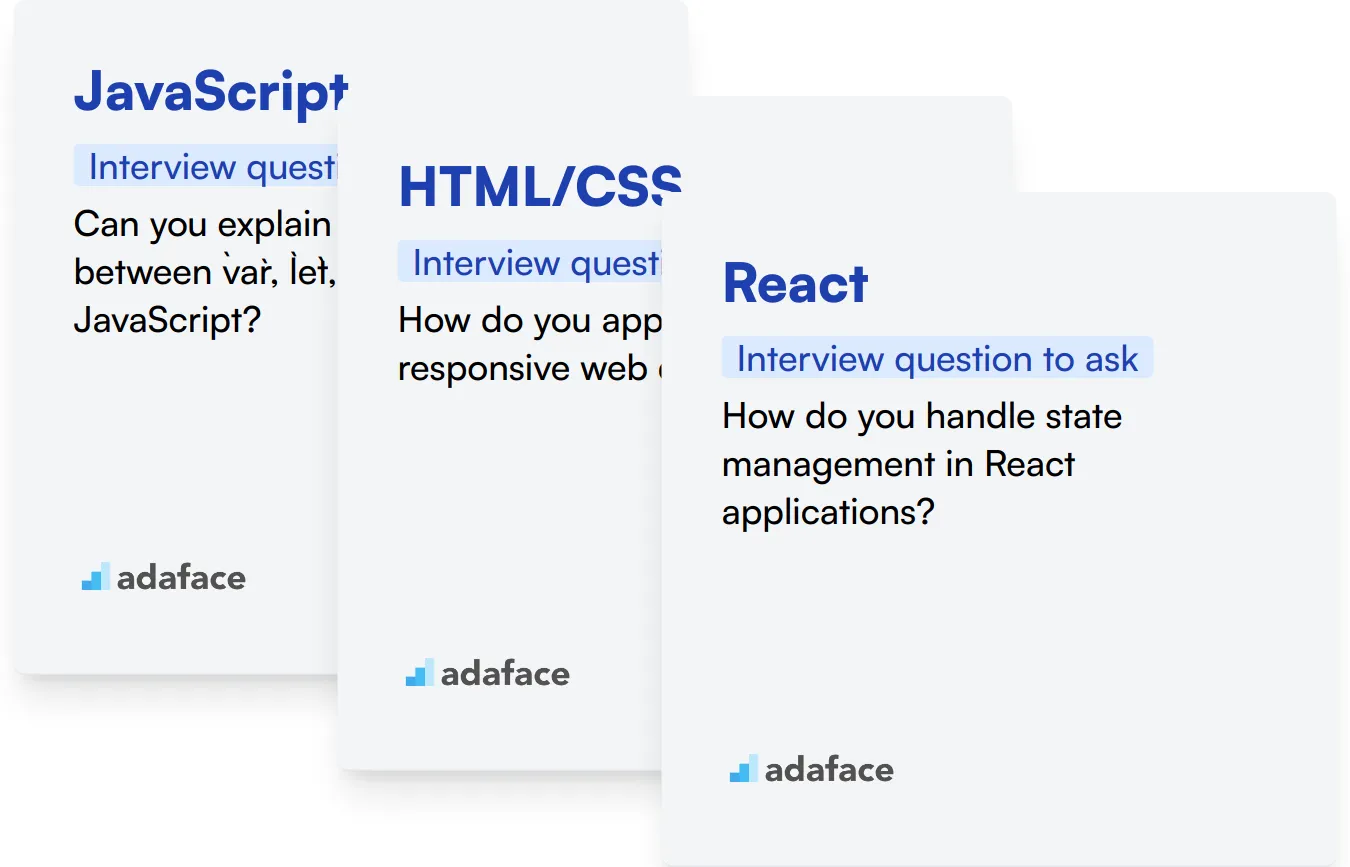
JavaScript
JavaScript is the backbone of front-end development, enabling dynamic interactions on web pages. Mastery of JavaScript is necessary for creating responsive and interactive user interfaces.
Assessing a candidate's proficiency in JavaScript can be efficiently done through targeted MCQs. Consider using the JavaScript online test from our library to gauge their knowledge effectively.
During the interview, posing specific questions can help evaluate the depth of a candidate's JavaScript knowledge.
Can you explain the difference between var, let, and const in JavaScript?
Look for clarity in understanding scope, hoisting and mutability. Candidates should articulate these differences with examples, showing practical understanding.
HTML/CSS
HTML and CSS are fundamental in structuring and styling websites, respectively. A strong grasp of HTML/CSS is critical for any front-end developer to ensure websites are both functional and visually appealing.
To screen candidates on these foundational technologies, consider leveraging our HTML/CSS online test.
In addition to testing, direct questions can further assess a candidate's expertise in HTML and CSS.
How do you approach creating a responsive web design?
The candidate's answer should include mention of fluid grids, flexible images, and CSS media queries, demonstrating a comprehensive understanding of responsive design principles.
React
React is a popular JavaScript library for building user interfaces, particularly single-page applications where dynamic content is a priority. Proficiency in React is indicative of a candidate's ability to develop modern web applications.
Evaluate their grasp of React concepts through our ReactJS test.
To deeply understand their proficiency, a practical question about React in the interview can be very revealing.
How do you handle state management in React applications?
Answers should include options like using React's own state, Context API, or external libraries like Redux. The candidate should display knowledge of scenarios for each approach.
3 tips for using Front-End Development interview questions
Before you start putting what you've learned to use, here are our tips to help you effectively employ Front-End Development interview questions.
1. Use skill tests before interviews and after candidate sourcing
Using skill tests before interviews helps to filter out candidates who lack the necessary technical skills, saving time for both parties.
Consider using tests like our Front-End Development programming tests to assess the candidates' coding abilities and knowledge of frameworks.
Skill tests can validate a candidate’s competence and provide a baseline for technical discussions during the interview. This ensures that the interviews focus on deeper insights and problem-solving abilities.
2. Compile relevant interview questions ahead of time
Creating a list of targeted interview questions ensures you evaluate the candidates thoroughly but efficiently. Choosing the right mix of questions is key.
Consider including questions from our communication and culture fit interview question lists to cover non-technical skills.
Tailoring your questions to the job role and the most critical skills required will maximize the success of your evaluations.
3. Ask follow-up questions to gauge depth of knowledge
Asking follow-up questions helps reveal a candidate's true depth of knowledge. It's not enough to know just the surface answer.
For example, if you ask, 'Can you explain the box model in CSS?' follow up with, 'How would you solve issues related to margin collapsing?' This follow-up assesses problem-solving skills and deeper understanding.
Use Front-End Development interview questions and skills tests to hire talented developers
When hiring Front-End Developers, it is important to accurately assess their skills to ensure they meet your requirements. The most effective way to achieve this is by utilizing skill tests, such as our Front-End Development assessment.
Once you have implemented this test, you can effectively shortlist the best applicants and invite them for interviews. To get started, consider signing up and exploring our online assessment platform for more tailored solutions.
Front End Developer Online Test
Download Front-End Development interview questions template in multiple formats
Front-End Development Interview Questions FAQs
Look for proficiency in HTML, CSS, JavaScript, responsive design, version control, and familiarity with popular frameworks and libraries.
Ask scenario-based questions, present coding challenges, or discuss past projects to evaluate their approach to problem-solving.
Yes, tailor your questions based on the experience level. Junior developer questions focus on basics, while senior developer questions delve into complex concepts and architectural decisions.
Soft skills like communication, teamwork, and adaptability are important. Include questions that assess these skills alongside technical knowledge.
Stay informed about industry trends, new technologies, and best practices. Regularly review and update your question bank to reflect current Front-End Development standards.

40 min skill tests.
No trick questions.
Accurate shortlisting.
We make it easy for you to find the best candidates in your pipeline with a 40 min skills test.
Try for freeRelated posts
Free resources




